Knowledge Management Directorate
Knowledge Management Directorate (KMD)
- About KMD
- Divisions
- Publications
- Policy Brief
- Researchers at KMD
- Contacts
About KMD
Knowledge management Directorate (KMD) committed to foster innovation by encouraging the culture of evidence generation and synthesis; proper documentation and achieve and codification of the data and information. The directorate is working to bridge know- do gap and influence the culture of knowledge translation to enhance evidence-based practices of the health services and health care system of the country and beyond. The directorate works further to enhance the uptake of research evidence through forums for research dissemination, preparing policy briefs, research digests, scientific and technical institutional reports. The directorate envisioned to enhance the institutional ability to update information easily and support, guide, consult and train researchers in overall usage of current health care technologies.
Major activities
- Research dissemination,
- Preparing policy briefs, issue briefs
- Research digests,
- Conducting Systematic review and Meta-analysis
- Preparing Scientific and technical institutional reports
- Conducting studies in one Health approach
- Capacity building
- Data management and archiving
Composition of the staff
Knowledge management Directorate (KMD) has 22 employees and 03 post graduate student. The staff includes graduates in biomedical clinical, public health and information communication technology (ICT). Under KMD there are three divisions those are, Data Science and Management, Knowledge Translation, and One Health.
Knowledge Management Directorate Division
1. Knowledge translation Division
Background
Promote the use of research results for programmatic, operational and policy decision by communicating research findings to policy makers, communities, health care professionals, the private sector and other stakeholders. Develop research summaries, policy and issue briefs, research digest and disseminate using research finding dissemination platforms. Engagement of policy makers also enables policy makers to make evidence based informed decisions. The division organizing and conducting regular scientific forums (Annual Scientific Conference, research finding dissemination forums and policy dialogue,
Major Areas of Focus/Initiatives
- Development of policy and issue briefs and research digests
- Conduct research dissemination forums
- Develop synthesized evidence to support evidence informed decision
- Strengthen Evidence synthesis and translation forum
- Capacity building on Evidence synthesis
- Advocate policy makers on the uptake of evidence based decision making
- Coordinate policy/stakeholder dialogue
- Ensure the enhancement of community engagement by involving the community in the research problem identification, problem prioritization, joint planning, execution dissemination, monitoring, and evaluation with partial and full engagement of the community
Composition of the staff
Knowledge translation division (KTD) has 04 employees.
- Eskedar Amenashewa (MSC in Health Informatics)
- Bizunesh Sintayehu (MA in Sociology)
- Endawoke Amsalu(PhD Epidemiology and Biostatistics )
- Yeabsera Alemu (BA Psychology)
2. One health Division
Background
The One-Health division strives at improving the health and well-being of communities, their animals and the environment they live in. The division support capacity building of One-Health expertise at post-graduate level, and provide training and awareness campaigns leading to improved laboratory capacity in diagnosing zoonotic diseases, and better awareness of diseases and their prevention. The ultimate objective is to support and strengthen integrated disease surveillance and response of neglected zoonotic diseases through operational research and translation into policy dialogue using interdisciplinary and Tran’s disciplinary approaches.
The division collaborate with national and international universities, NGOs, the Ethiopian Government (e.g. federal ministries, regional health sector bureaus, RRS, EWCA), and international institutions
Major areas of the research
- Pastoralist health
- Health in refugees, migrants and IDPs
- Mother and child Health
- Water borne pathogens
- Milk borne pathogens
- Environment health & wildlife
- Zoonosis
- Integrated surveillance and response systems
- Anti-microbial resistance
- Micro biome and One-health
- Emerging Infectious Diseases
Activities that conduct through division
The division currently focuses on three major areas. Namely health in pastoralists, (Afar, Somali region) health in migrants and IDPs (Afar) and milk-borne zoonosis in the dairy hub of Central Ethiopia.
Pastoralist health
The Jigjig One Health Initiative (JOHI) in partnership with Jigjiga University and Swiss TPH is supporting Jigjiga University to become a Center of Excellence in One Health in the pastoral context. Operational research in the field of human, animal and environmental health, supported by capacity building of the lab and academic capacity through the establishment of a one Health MSc program, as well as the establishment of a community based integrated animal-human-environment surveillance system are some of the major activities grounding Jigjiga University to become a leading institution able to diagnose efficiently human and animal diseases in the Somali region. Additionally, cross-border collaboration with Hargeissa University (Somaliland) and the Somali National University allow expanding capacity building and strengthening/alignment of disease surveillance and control between neighboring countries.
Similarly, in neighboring Afar, neglected zoonotic diseases are being investigated (e.g. brucellosis, Rift Valley Fever, Q fever) at the human-animal interface through various project. Brucellosis control strategies are currently being assessed, tailored to pastoral contexts. Capacitating regional labs and provide trainings for laboratory technicians, while fostering a One-Health dialogue.
Migrant health
Ethiopia is host country for nearly 1 million refugee migrants and asylum seekers as well as nearly 3 million internally displaced people (IDPs). The division collaborates with the Refugee and Returnee Services (RRS) to assess their health needs and strive towards improved diagnostic for infectious diseases.
Milk-borne zoonosis
The Division has been involved in tuberculosis and bovine tuberculosis (BTB) for the last 18 years. Supported by various grants, we investigated as part of international and national consortia, the epidemiology of BTB, and assessed the cost of intervention strategies to control the disease in the dairy sector of Ethiopia. We also investigate other milk-borne pathogens. We aim at strengthening the surveillance and control of milk-borne pathogens, mainly in the main milk hub of Central Ethiopia.
Viral and bacterial zoonosis
We conduct several research studies, involving post-graduate students. To name few: we investigate the epidemiology of Campylobacter, Cryptosporidiosis, Q fever, Rift valley Fever, Echinococcus, rabies and fasciolosis at the human-animal interface in collaboration with national universities (e.g. Jimma University, Haremaya University)
Composition of the staff including total number of the staff
The One-Health Division currently consists of 4 staff members and 14 post-graduate students were included in 2023.
3. Data science Division
Back ground
Data science division has been engaged the process of creating, managing, analysis, storing and biomedical, clinical, clinical epidemiology, genomics data which is generated by the institute as an integrated task flow. This division play key role in the outstanding researches held in AHRI from methodology to analysis.
Major area of the Research
With almost more than one decades working in biomedical research, Clinical Trial, Immunology and molecular biology, epidemiology and translational research. Consulting students and researchers on statistical methodology, statistical data analysis and output interpretation again support on the preparation data management and statistical plan. The division team broad experience in all the stages of development of research projects.
Major Activities
Research Methodology support funds. : Planning of statistical methodology, sample size determination and study design for the protocols of the projects that are seeking for grants and
Data management: Guidance on the selection of appropriate and secured data management tools and methods. Configuration and tuning of open source software (Redcap, Open Clinical…) to meet special data analysis or study design needs. Database design and development of web interface application or extensions to manage data. Questionnaires review and study implementation (sites, events, eCRFs, subject definition, users and roles) in the selected software tools Data management plan with support documentation and training for different roles, data management SOP, data control logs, audit logs, data quality checks and validations monitoring and data cleaning. Data entry, batch data entry or import and data export, periodical data reports. Use of the information security Global infrastructures (SSL, Firewall). hardware and software for hosting and communication in the secure Research Institute data center.
Data analysis: Performing statistical analysis of clinical and biomedical data .Assistance in statistical analysis performed by researchers drafting and revising statistical methodology, result and interpretation output in the manuscript.
Training: Providing data management and statistical data training based on the use of STATA, R and SAS software for researchers and students (MSC, PhD)
Data science Team members
Data managers and Biostatician
Tigist Beyene (MSC, Statistics and Health Informatics)
Tsegaye Hailu (PhD candidate, applied statistics)
Wondu Wagaye (BSc, Computer science)
Fozia Getachew (BSc, Computer science)
GIS
Wude Wale (BSC, GIS)
Data Quality Team members
Mitin Wendaferew (BA, IT and Management)
Zenebech Assefa (BA, IT and Accounting)
Hana Kelile (BA, IT and Marketing)
Edom Girma (BSC, Statistics)
Elisa Muleta (BSC, Nutrition
Publication
2023/24
- Bacterial profile and antimicrobial resistance patterns of infected diabetic foot ulcers in sub-Saharan Africa: a systematic review and meta-analysis (https://doi.org/10.1038/s41598-023-41882-z)
- Adherence to evidence-based implementation of antimicrobial treatment guidelines among prescribers in sub-Saharan Africa: a systematic review and meta-analysis(https://doi.org/10.1186/s40545-023-00634-0)
- Surgical System Efficiency and Operative Productivity in Public and Private Health Facilities in Ethiopia: A Cross-Sectional Evaluation. https://doi:org/10.9745/GHSP-D-22-00277
- Surgical Capacity in Public and Private Health Facilities After a Five-Year Strategic Plan Implementation in Ethiopia: A Cross Sectional Study. https://doi:org/10.5334/aogh.3871
2022/23
- Uptake of cervical cancer screening and its predictors among women of reproductive age in Gomma district, South West Ethiopia: a community-based cross-sectional study(https://doi.org/10.1186/s13027-022-00455-x)
- Prevalence of Group B Streptococcus maternal colonization, serotype distribution, and antimicrobial resistance in Sub-Saharan Africa: A systematic review and meta-analysis(https://doi.org/10.1016/j.jgar.2023.02.004)
- Individual and Social Level Factors Influencing Repeated Pregnancy among Unmarried Adolescent Mothers in Katavi Region—Tanzania: A Qualitative Study(https://doi.org/10.3390/children9101523)
2021/22
- Male partners’ participation in birth preparedness and complication readiness in low-and middle-income countries: a systematic review and meta-analysis(https://doi.org/10.1186/s12884-021-03994-0)
- Prevalence and antimicrobial susceptibility level of typhoid fever in Ethiopia: A systematic review and meta-analysis(https://doi.org/10.1016/j.pmedr.2021.101670)
- Prevalence of antimicrobial resistance and its clinical implications in Ethiopia: a systematic review(https://doi.org/10.1186/s13756-021-00965-0)
- Assessment of maternal and child health care services performance in the context of COVID-19 pandemic in Addis Ababa, Ethiopia: evidence from routine service data(https://doi.org/10.1186/s12978-022-01353-6)
- Compliance with the World Health Organization’s surgical safety checklist and related postoperative outcomes: a nationwide survey among 172 health facilities in Ethiopia(https://doi.org/10.1186/s13037-022-00329-6)
- Access to surgical care in Ethiopia: a cross-sectional retrospective data review(In press)
Researchers at KMD
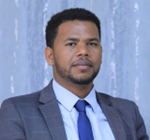 Akililu Alemu (PhD)
Akililu Alemu (PhD)
Director, Knowledge Management Directorate
Email: akililu.alemu@ahri.gov.et
Akililu (PhD) is Researcher and Director at Knowledge Management Directorate. He has Masters in Public Health (MPH) and PhD in Epidemiology and Biostatistics. His research focuses on HIV, Gut microbiota, and Health System Research, Evidence Based Health Care. He has extensive work experience in the Ethiopian Health System and leadership. Akililu has authored or co-authored in numerous scientific articles.
1. Knowledge translation division
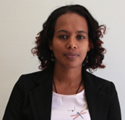 Eskedar Amenashewa (BA,M.Sc)
Eskedar Amenashewa (BA,M.Sc)
Knowledge Translation Division Head
Email: eskedar.amenashewa@ahri.gov.et
Eskedar is researcher and knowledge translation division head at knowledge management directorate; she has M.Sc in Health Informatics and has more than 13 years of technical and managerial experience in the overall health system planning and M&E, health policy, evidence translation and communication.
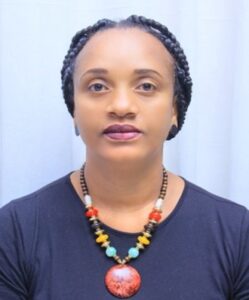 Bizunesh Sintayehu
Bizunesh Sintayehu
Knowledge Translation Division team member, Researcher
Email: bizunesh.sintayehu@ahri.gov.et
Bizunesh Sintayehu is a sociologist by profession. She has got her BA and MA Degrees in Sociology from Haramaya University. She has more than 15 years of work experience in different governmental and non-governmental organizations in different positions. She worked as a data Processor at Haramaya University Registrar, Social worker, Community Development Officer at Harar SOS Children Village, and Community Facilitator and Data Analyst at Haramaya University-CHAMPS program are her major job carriers so far. Currently, she is working as a Community Engagement in Research Coordinator.
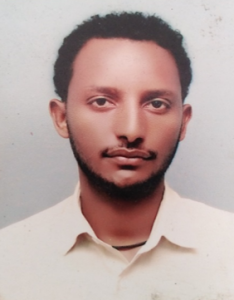
Endawoke Amsalu (PhD)
Knowledge Translation Division team member, Researcher
Email: indexmar@outlook.com
Endawoke Amsalu (PhD) is a Researcher and has Masters in Public Health and PhD in Public Health-Epidemiology and Health statistics from the University Capital Medical University, Beijing. He is currently working in the evidence synthesis and translation of research evidence into policy and practice to encourage the policy decision makers reach an evidence-informed and context-specific decision. He has been working in the Ethiopian health system over the last 10 years in various positions. Endawoke has authored 10 research publications in peer-reviewed journals as author and coauthors.

Minyahil Tadesse Boltena (MPH, PhDc)
Researcher and Specialist in Evidence to Policy Translation for Health Systems in Ethiopia.
Email: minyahil.tadesse@ahri.gov.et or minyahil.t@gmail.com
ORCID: https://orcid.org/0000-0002-5081-1480
Minyahil Tadesse Boltena is a PhD Fellow in Evidence-Based Health Care at the Ethiopian Center For Evidence-Based Health Care, A JBI Center of Excellence, Institute of Health, Jimma University. He is also a fellow of the Joanna Briggs Institute (JBI) in Adelaide, Australia and The Center for Implementation (TCI) in Canada. He has attended training on Evidence-Based Practice from McMaster University in Canada. He has been principally involved in the evidence synthesis and knowledge translation enabling the policy decision makers to make an evidence-informed and context-specific decision.
He has recived award on the Train of the Trainee (TOT) on Comprehensive Systeatic Review from JBI.
Minyahil has been working in the Ethiopian health system over the last twelve years including working in partnership with the Imperial College London and the World Health Organization among other international organizations. He has authored and co-authored in 17 research publications in peer-reviewed highly reputable journals with having seven more publication works underway.
Minyahil has received the Intellectual Property Rights (IPR) for his innovation on the development of mobile health application (STGapp) of the Ethiopian Standard Treatment Guideline through seed abd transition to scale fund from the Grand Challenge Ethiopia.
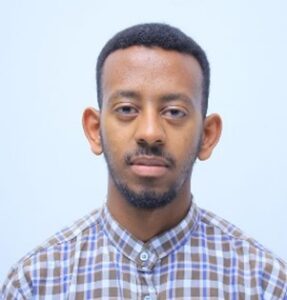 Yeabsira Alemu
Yeabsira Alemu
Knowledge Translation Division team member, Researcher
Email: yeabsiraalemu34@gmail.com
Yeabsira Alemu is a Psychologist and also junior researcher. He worked as an expert in gender department for one and half year, otherwise, currently He working as a junior researcher under knowledge management Directorate Knowledge translation division. He has BA degree in Psychology from Bahir Dar University.
2. Data Science and Management division
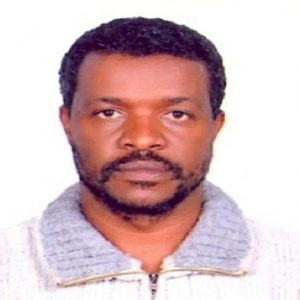 Tsegaye Hailu
Tsegaye Hailu
Data Science division head
Email: tsegaye.hailu@ahri.gov.et
He is PhD candidate in Applied Biostatistics .He has been working in delivering research methodology training, analysis varies project and he has authored and co-authored in the publication of more than 30 cutting –edge research articles on highly reputable peer-reviewed journals.
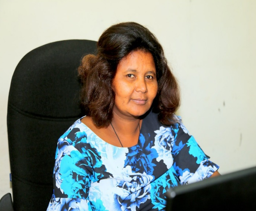
Tigist Beyene
Researcher
Email: tigist.beyene@ahri.gov.et
Tigist Beyene is a Researcher working in Knowledge management directorate in data science division. She has M.Sc degree in Health informatics from Addis Ababa University (school of information science and school of public health) and she has BSc degree in Statistics from Addis Ababa University. She is currently working as data manager and statistician on various projects for the last 15 years and above at AHRI.
![]() Wondu Wagaye Yanda
Wondu Wagaye Yanda
Assistant Researcher
Email: wonduwyg@gmail.com
Wondu Wagaye is an assistant researcher working in knowledge management directorate in data science division He has BSc degree in computer science from Adama Science and Technology University He is currently working as data manager on various projects over the last 15 years.
 Elsa Muleta (BSc)
Elsa Muleta (BSc)
Junior Researcher
Email:elsamuleta21@gmail.com
Applied human nutrition in Bahirdar University
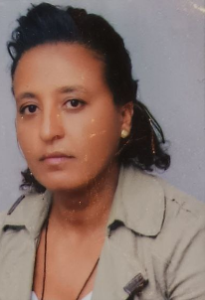 Zenebech Assefa
Zenebech Assefa
Data entry and Cleaning
Email:zenebechassefa6@gmail.com
Diploma in IT from CPU university collage
BA in Accounting from Haramaya University
 Hana Kelil kidane
Hana Kelil kidane
Data Clerk
Email:Hanakelil2@gmail.com
Diploma in Health Information Technique
Addis Abeba Tegbareid polytechnic college
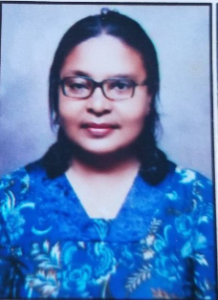 Mitin Wendaferew
Mitin Wendaferew
Data entry and cleaning
Email:elsamuleta21@gmail.com
Diploma in IT from CPU university collage
BA in Management from Rift Valley university collage
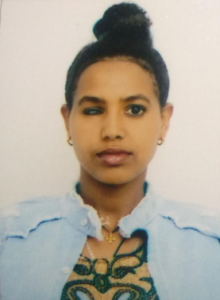 Wudie Walle
Wudie Walle
Junior Researcher
Email:wudiewalle@gmaile.com
BSc Degree in GIS from Hawassa University
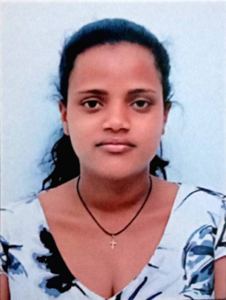 Eadom Girma
Eadom Girma
Assistant Researcher I
Email: edom0927987755@gmail.com
BSc in Statistics from Haramaya University
MSc in project management from lunar international collage
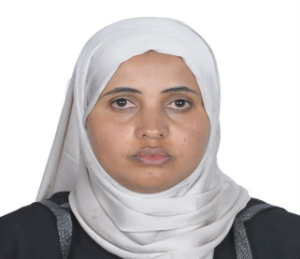 Foziya Getachew
Foziya Getachew
Assistant Researcher I
Email: foziatg37@gmail.com
BSc in computer science from Rift Valley University collage
3. One Health division
Rea Tschopp (DVM, MSc, PhD)
Head One-Health Unit AHRI
Email: rea.tschopp@ahr.gov.et
Phone; +215911427021
Gizachew Gemechu (DVM, MSc)
Researcher II
Email: gizachew.gemechu@ahr.gov.et
Phone; +215913033529
Ashenif GebreGiogis (DVM,MSc)
Associate Researcher II
Email: ashenafi.gebregiorgis@ahr.gov.et
Phone; +215911771890
Mahelet Osman (BSc, MSc)
Associate Researcher I
Email: ahi2b4@yahoo.com

Akililu Alemu (PhD)
Director, Knowledge Management Directorate
Email: akililu.alemu@ahri.gov.et
Tel: +251910793782